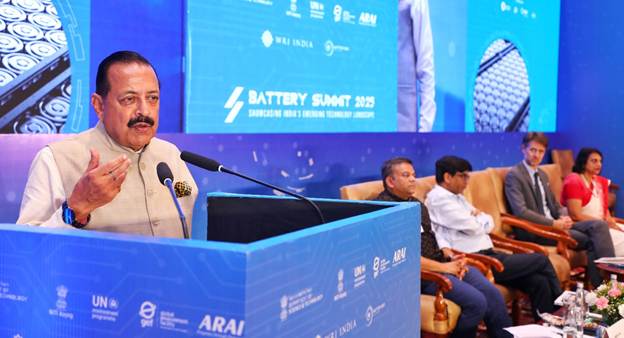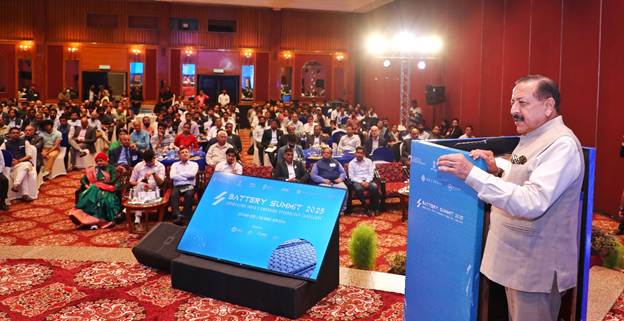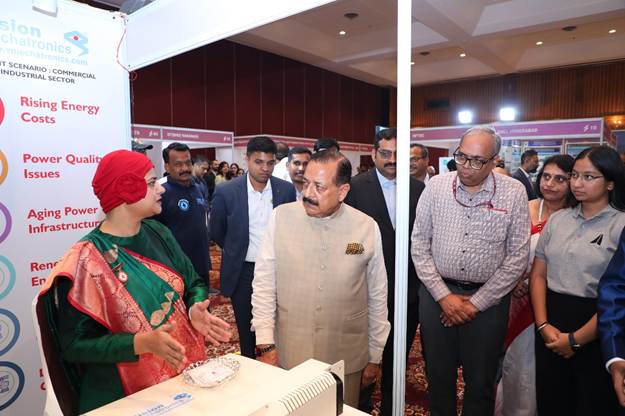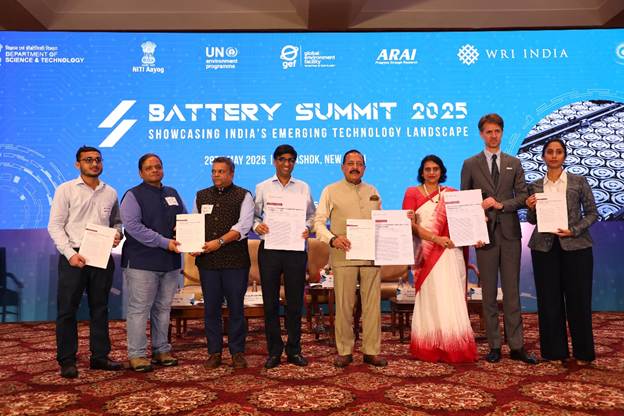Ministry of Science & Technology
A robust ecosystem will help India propel itself to be the world’s third-largest economy from the recently achieved Rank 4, while low-carbon technologies will be key to achieving India’s Net Zero 2070 target: Dr. Jitendra Singh
The Minister highlighted that exploring untapped reserves and resources, along with innovation in low-carbon energy sectors, will drive economic value and reduce the carbon footprint, aligning with India’s ambitious Net Zero by 2070 goal
Dr. Jitendra Singh refers to the recent discoveries of vast lithium reserves in Jammu & Kashmir, which promise to contribute to achieving the target, and called for intensified efforts to explore and harness such hitherto unutilized resources
“Battery Aadhar Initiative under DST assigning unique digital ID to be a Game Changer” says Dr. Singh
Posted On:
28 MAY 2025 5:39PM by PIB Delhi
Union Minister of State (Independent Charge) for Science & Technology, Minister of State for Prime Minister’s Office, Personnel, Public Grievances, Pensions, Atomic Energy and Space, Dr. Jitendra Singh, addressed the Battery Summit 2025, emphasizing that a robust echo system will help India propel to number 3 economy from the recently achieved Rank 4 while low carbon technologies will be key to India achieving Net Zero 2070 target.

Speaking on the theme, “Addressing Challenges, Driving Innovation and Scaling Solutions", Dr. Jitendra Singh highlighted that exploring the unexplored reserves and resources, and innovation in low carbon energy sectors will drive economic value and also reduce carbon footprint, aligning with India’s ambitious Net Zero by 2070 goal.
In this context, the Minister also referred to recent discoveries of vast Lithium reserves in Jammu & Kashmir which promise to contribute to achieving Net Zero 2070 target and called for intensified efforts to explore and harness such hitherto unutilized resources.
“The Department of Science and Technology (DST) is playing a pivotal role in advancing India's clean energy transition through innovations in battery manufacturing, e-mobility, and sustainable technology ecosystems,” said Dr. Singh.
A major announcement at the summit was the launch of the Battery Aadhaar Initiative under DST, described by the Minister as a "game changer" in enabling traceability, efficiency, and scalability in India's battery ecosystem. This system would assign a unique digital identity to each battery pack, enabling the tracking of manufacturing origin, battery chemistry, safety certifications, and lifecycle performance. It would also monitor critical parameters such as thermal events, charge-discharge cycles, and end-of-life status, facilitating predictive maintenance and efficient recycling. Additionally, Battery Aadhaar would act as a regulatory tool to curb the spread of counterfeit products and boost consumer confidence, while supporting circular economy initiatives. By integrating with Battery Management Systems (BMS), AI-enabled diagnostics, and national EV databases, Battery Aadhaar could become a cornerstone of India’s emerging battery intelligence ecosystem.

Dr. Jitendra Singh underlined the success of several forward-looking initiatives driving India's clean energy transition, including the Production Linked Incentive (PLI) Schemes for Advanced Chemistry Cells, the E-Mobility Transition, and flagship programs such as the PM-eDrive and FAME (Faster Adoption and Manufacturing of Electric Vehicles) Schemes. He also highlighted the Dedicated MAHA-EV Mission under the Anusandhan National Research Foundation (ANRF) as a significant step toward strengthening the electric vehicle ecosystem and promoting sustainable transportation solutions.
Recounting India’s journey in climate negotiations, Dr. Jitendra Singh noted the significant transformation from being perceived as a reluctant participant to emerging as a global leader in climate commitments. He attributed this remarkable shift to the launch and success of key initiatives such as Net Zero 2070, which outlines India’s long-term decarbonization goals; Mission LiFE (Lifestyle for Environment), aimed at promoting sustainable individual and community behaviors; and the International Solar Alliance (ISA), a collaborative platform that underscores India's leadership in promoting solar energy and global clean energy partnerships. “These efforts have elevated India’s esteem at global forums and affirmed our leadership in sustainability and climate action,” he stated.
Dr. Jitendra Singh highlighted the remarkable progress India has made in the domain of science and innovation over the past decade. He noted that India has significantly improved its position in the Global Innovation Index, rising from the 81st rank to the 39th. The country has also witnessed an exponential growth in its startup ecosystem, expanding from just 350 startups in 2014 to over 1.7 lakh in 2025, making it the third-largest startup ecosystem in the world. Complementing this growth, the Department of Science and Technology (DST) has seen a 926% increase in its budget, soaring from ₹2,777 crore to ₹28,509 crore, reflecting the government’s strong commitment to fostering innovation and research.
The Minister emphasized the government's commitment to strengthening the innovation ecosystem by opening up the space, nuclear, and science sectors to private participation.

Highlighting initiatives under the Anusandhan National Research Foundation (NRF), he noted that 60% of its funding will come from the private sector, despite significant government support. Key missions such as the National Quantum Mission, AI Mission, and National Supercomputing Mission were described as strategic levers for future leadership.
Guiding the summit’s roadmap, Dr. Jitendra Singh outlined three key priority areas essential for sustaining India’s momentum in science and clean energy innovation. He emphasized the indigenization of technology to reduce dependence on imports and strengthen self-reliance, the importance of boosting domestic manufacturing to build resilient supply chains and generate employment, and the need for creating a robust innovation ecosystem that fosters collaboration between academia, industry, and government to drive transformative research and scalable solutions

Dr. Singh applauded the efforts of WRI India for championing sustainable practices, particularly through the Battery360 Alliance, and acknowledged the support of UNEP, NITI Aayog, and the Global Environment Facility (GEF) in India’s clean energy journey.
The summit was graced by the presence of several key dignitaries who are instrumental in driving India’s science, technology, and sustainability agenda. These included Prof. Abhay Karandikar, Secretary, Department of Science and Technology (DST); Mr. Asher Lessels from the United Nations Environment Program (UNEP); Dr. Anita Gupta, Head of the Climate, Energy and Sustainable Technology (CEST) Division Division at DST; and Mr. Madhav Pai, CEO of WRI India. Their participation underscored the collaborative spirit of the summit and the shared commitment to accelerating clean energy innovation.
******
NKR/PSM
(Release ID: 2132105)
Visitor Counter : 629